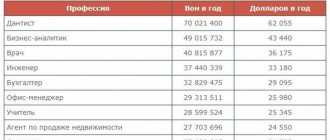The interest of foreigners in Italy in most cases does not go beyond visiting ancient historical monuments or modern fashion boutiques. But there are also those who seriously and for a long time decide to move to a new place. In such situations, you need to imagine as accurately as possible what kind of work a newcomer can expect and what salary in Italy awaits him at first.
Employment in Italy
The indigenous population of Italy has never taken credit for being overly enthusiastic about work responsibilities - labor productivity here is one of the lowest in the European Union. The rather high level of unemployment does not contribute to its increase. At the end of 2021, its indicator did not drop below 10%; in December, statistics recorded that 10.3% of the active population remained in search of a place.
It is noteworthy that the percentage of job seekers in the north of the country is only 7.7% versus almost 19% in the southern regions. The same geographical division is noticeable in terms of the leading sectors of the economy: the north is represented more by industrial enterprises; for job seekers in the south, work in Italy will be found in agriculture.
The main sectors of the economy in Italy are:
- tourism: excursion, beach holidays, organization of services, trade and catering for visitors;
- industry: mainly the production of clothing, shoes, as well as the assembly of cars and motorcycles, household appliances;
- agro-industrial complex - crop production: grapes, grains, corn, olives, tobacco, fruits and vegetables are grown;
- government sector.
Minimum wage in Italy
Unlike Russia, Italian legislators do not welcome a regulatory limit on the minimum wage. But in Italy, a much more significant role is played by trade unions, which truly defend the interests of the working population.
Through their efforts, 53 national agreements have been concluded with employers in most sectors of the economy. These agreements cover about 9.8 million workers, which is 75.8% of the number of employed citizens.
Since the minimum wage in Italy is not regulated by law, we can only talk about in which cases hired personnel receive the least for their work:
- territorial division - the lowest salaries are in Calabria (just over 23,800 euros/year), and slightly higher in Molise and Basilicata (no more than 24,760 euros/year);
- by profession - traditionally blue-collar professions are paid lower than others (about 25,700 euros/year);
- by gender – women still earn less than men (just over 27,000 euros/year, the national average for women’s salaries is 20% lower);
- by economic sector – the lowest place in the ranking is occupied by agriculture (around 23,000 euros/year).
How much do workers earn in Italy in 2021?
The gap between the region with the highest average salary and the lowest average salary is 23.5%, with a worker from Emilia-Romagna earning around 5,500 euros more than a worker from Calabria.
Workers in the Emilia-Romagna region receive the highest salaries (29,087 euros), earning approximately 2,000 euros more than the Italian average (+7.5%). They are followed by workers in Lombardy (28,284 euros), with a salary 4.5% higher than the average, about 1,200 euros more, and Trentino-Alto Adige (28,194 euros), with a salary about 1,100 euros above the average (+ 4.2%).
See also: Work in Vietnam for Russians vacancies 2021 without knowledge of the language
The region where workers' wages are lowest is Calabria (€23,545), where a worker earns 13% less than the national average, about €3,500 less per year. In second to last place are workers in Abruzzo (24,234 euros), earning about 2,800 euros less compared to the national average (-10.5%) and in third place from the bottom is Sicily (24,799 euros), where wages are lower than the national average by 8.4%, which corresponds in monetary terms to more than 2,250 euros less.
National averages
In recent years, the average wage in Italy has been growing, albeit at a low rate. At the end of 2021, the average gross income approached 29,309 euros per year, which in percentage terms amounted to 2.1% of the 2021 level. However, this does not fully reflect the situation in each specific industry.
Thus, according to the Italian Statistical Service (Istituto Nazionale di Statistica), the growth was:
- industrial and private commercial sector - 1.1%;
- public administration organizations – 3.6%.
If we consider income growth by profession, the following growth trends in hourly wages are observed in comparison with 2021:
- firefighters - 5.2%;
- law enforcement officers – 4.0%;
- military – 4.2%;
- telecommunications workers – 1.9%;
- employed in agriculture – 1.7%;
- in the trade sector – 1.6%.
The overall percentage growth in the public sector was 2.6%.
A simple arithmetic operation cannot calculate what the average salary in Italy really is, because the amount of 29,309 euros includes both the meager incomes of general workers and the earnings of senior managers that are many times higher than their earnings. In addition, in Italian large companies it is customary to pay employees not only the thirteenth salary: legislation allows for the payment of up to 16 salaries in 12 months. The income of most Italians is between 1,300 and 1,500 euros.
Salaries in Italy in 2021
Impact of education level, sector of employment and gender of workers on wages
Salaries differ, of course, depending on the area of employment.
The dominant segments of the ranking continue to be the banking and finance sector, where the average annual salary currently stands at 41,864 euros. Banks and financial institutions are followed by engineering, pharmaceutical and insurance companies, with average salaries of about 33 thousand euros.
At the bottom of this ranking we find the agricultural sector, whose workers have salaries of around 24 thousand euros per year.
In these calculations, of course, we must also take into account the different levels of specialization required in different industries: in agriculture, for example, 90% of employed workers are general workers.
Over the past year, wages in all sectors except agriculture have increased slightly.
In terms of gender differences, men in Italy earn, on average, €3,000 per year more than women (6%). This percentage, the report says, is one of the lowest in the European Union. On average, the gap between women's and men's pay across the EU is 16.7%.
The report also goes into detail about the generational pay gap: in fact, a twenty-year-old worker earns about 25 thousand euros a year, while a 65-year-old takes home more than 35 thousand euros.
In terms of education, ultimately, its level significantly determines the level of a worker's salary: those who attended university earn on average 40,000 euros per year in Italy, compared to 28 thousand euros for those workers who do not have an academic degree. degrees.
Average salary in Italy by profession
Even if wage growth in Italy is very restrained, and the minimum wage in many professional categories is lower than in some European countries (for example, Germany), the wages of specialists employed in the pharmaceutical sector are increasing most rapidly (2.6% compared to the year ago) and financial services (2.6%).
This is data obtained as a result of a study by the Willis Towers Watson group on a sample of 391 medium-sized Italian companies, which analyzed the salary levels of about 180,000 workers.
According to data last year, average wages in Italy grew by 2.5% (considering that last year inflation was 0.9%, real wage growth was 1.6%), confirming the trend of recent years, while approximately the same Other Western European countries also demonstrate the same indicators.
The average salary in Italy increases only mainly due to the influence of basic elements such as length of service and career progression.
What are the most in-demand professions in Italy? Traditionally, these are IT specialists (in particular professionals who are involved in testing and monitoring digital processes, digital security and application development) and engineers.
Below we will talk about the average salaries of representatives of the most common professions.

How much do doctors earn in Italy?
The average salary for a doctor in Italy is 75,000 euros gross per year (approximately 3,400 euros net per month), 1,850 euros higher than the average monthly salary in Italy.
The salary of a doctor, however, depends on his qualifications and can start from a minimum figure of 45,000 euros per year to a maximum that can exceed 300,000 euros per year.
The average salary of a general practitioner is 105,000 euros gross per year (about 4,600 euros net per month), which is 3,050 euros higher than the average monthly salary in Italy.
However, depending on the length of service, the salary of a general practitioner can start from a minimum of about 64,400 euros per year to a maximum of 192,900 euros per year.
The average salary for a nurse in Italy is €1,450 net per month (approximately €26,400 gross per year), which is €100 (-6%) lower than the average monthly salary in Italy.
A nurse's salary can start from a minimum salary of €1,150 net per month, while the maximum salary can exceed €2,300 net per month.
How much do police officers earn in Italy?
The salary of a police officer in Italy is calculated according to position and length of service. In the absence of career growth, police salaries increase in the 17th, 27th and 2nd years of service.
In general, a police officer earns more than other employees of the State Administration: about 34,500 euros per year versus about 28,500 euros. Obviously, this is the average salary of a police officer in Italy, because the real one varies depending on length of service and position, as we have already said, in addition, a police officer performing duties outside his hometown receives 26 euros per day more for travel expenses .
A young policeman who recently left the academy earns about 1,000 euros a month at the beginning of his working career.
The average salary of an Italian police agent is around €1,200 per month.
How much do teachers earn in Italy?
The profession of a school teacher and kindergarten teacher is very exciting and is often chosen. How much does a teacher earn in Italy? How high is the salary compared to your middle school and high school counterparts?
A teacher's salary in Italy varies depending on his length of service.
The monthly “gross” income, according to data for 2021, of a school teacher is:
- 1871.93 euros, from 0 to 8 years of experience;
- 2050.42 euros, from 9 to 14 years of experience;
- 2246.22 euros, from 15 to 20 years of experience;
- 2399.10 euros, from 21 to 27 years of experience;
- 2609.35 euros, from 28 to 34 years of experience;
- 2724.94 euros, more than 35 years of experience.
The difference in the average monthly salary of a kindergarten teacher, primary and secondary school teacher is about 200 euros per month.
How much does a chef earn in Italy?
The average salary for a chef in Italy is €1,850 net per month (approximately €35,500 gross per year), which is €300 higher (+19%) than the average monthly salary in Italy.
A chef's salary can start from a minimum salary of 900 euros net per month, while the maximum salary can exceed 6,800 euros per month.
How much does a tourist guide earn in Italy?
The average salary of a tourist guide in Italy is 130 euros gross per day (approximately 1400 euros net per month), 150 euros lower (-10%) compared to the average monthly salary in Italy.
Pay for a tourist guide can start from a minimum salary of 70 euros per day, and the maximum salary can exceed 350 euros per day.
How much do programmers earn in Italy?
The average salary of a starting IT specialist is 1,350 euros net per month (about 24,300 euros gross per year), which is 200 euros lower (-13%) than the average monthly salary in Italy.
A computer technician's salary can start from a minimum salary of 900 euros net per month, while the maximum salary can exceed 2200 euros per month net.
You can read more about the salaries of IT specialists in Italy in this article.
How much do engineers earn in Italy?
The average salary for an engineer in Italy is 38,000 euros per year (approximately 1,950 net euros per month), which is 400 euros higher (+ 26%) compared to the average monthly salary in Italy.
An engineer's salary, depending on experience and qualifications, can start from a minimum salary of 17,000 euros per year, while the maximum salary can exceed 125,000 euros per year.
Differences by Industry
The significance and share of a particular industry in the formation of the country’s GDP does not in any way affect what wages in Italy will be for locals or immigrants.
| Sphere | Italian wages, euro/month | Migrant salary |
| Agriculture | 1900 | 700-800 euros per month, seasonal work |
| Tourism | 1750 | No more than 1,000 per month |
| Automotive industry | 3500 | Workers with education invited on work visas receive salaries at the level of local citizens |
| Light industry | 2500 | |
| Financial sector | 3500 |
The most promising sector is the state one, but to find employment in this area you need to be a citizen of the country, have a diploma of education in Italy or an educational institution recognized in the EU, and know the language. Visitors cannot count on being a government official or law enforcement officer.
Minimum salary in the country
It is worth drawing the attention of readers to the fact that in Italy there is no minimum wage.
At the beginning of 2021, wages continue to be calculated in accordance with industry agreements. Our experts note that the minimum income of emigrants in Italy reaches only one thousand euros, and this is only for those who have officially entered into a contract. Citizens who have recently graduated from higher universities also receive a minimum income. In 2021 it amounted to about 900 euros per month.
Today, the average salary in the country is approximately 700 euros per month. The minimum income of a foreign pensioner who has been officially employed is 700 euros. The pension, which is calculated from the state budget, is equal to 1,500 euros. The average age at retirement is 65 years.
Income by specialty
General averages do not reflect the real situation. The amount of monthly income depends on:
- position held (a middle manager earns four times more than an ordinary employee, and the earnings of a top manager can be 10 times higher);
- areas of employment and qualifications;
- region of location of the employer (salaries in the north are 16.9% higher than in the south);
- the general level of prices in cities of residence (the higher the costs, the higher wages employers are forced to pay).
If we take average values, salaries in Italy by profession are distributed as follows:
- Emergency doctors and municipal clinics, pharmacists earn up to 2,000 euros;
- medical staff in a public hospital - 1,000 euros, and in private medical institutions - up to 3,000 euros;
- bank employees - from 2,000 to 4,000 euros per month;
- accountants receive up to 1,500 euros per month, and heads of accounting services - up to 4,000 euros;
- construction specialists – 1,400–2,500 euros;
- the salary of a programmer in Italy is up to 3,500 euros and depends on the qualifications of an IT specialist;
- in catering, income ranges from 800 euros for service personnel to 1,800 euros for chefs and establishment managers;
- working professions (plumber, electrician, welder) are also paid differently - up to 2,000 euros, subject to complex work;
- general workers, unskilled personnel (cleaners, orderlies, harvesters, handymen and others) receive the least - up to 600 euros;
- The average salary of a teacher in Italy is about 2000 euros and this is due to the fact that the education sector is understaffed with specialists.

Foreign students studying at Italian universities often take part-time internships in large companies. This part-time job brings in up to 500 euros monthly.
Specialists such as realtors, brokers and financial analysts, lawyers, photographers, and image makers have high incomes. However, most often their earnings consist of an agent commission or a fee for a successfully completed order.
Salaries for individual specializations can vary dramatically even within the same profession. If we talk about how much a doctor earns in Italy, then you need to understand that plastic surgeons, dentists and gynecologists in private clinics can earn several hundred thousand a year.
What professions are considered the highest paid in Italy?
The most profitable areas of activity in the country are:
- medicine;
- management;
- banking;
- information Technology;
- real estate trade;
- energy;
- fashion and beauty;
- tourism.
High earnings in the fashion industry are mainly due to receiving large fees for completed orders.
The specificity of income distribution among Italians is gender inequality. Men earn on average 3 thousand euros (214 thousand rubles) per year more than women.

Sergio Canavero, a famous Italian neurosurgeon, is one of the highest paid specialists
Doctor is one of the highest paid and in demand professions. To get a job, you need an Italian diploma, or you will have to go through the procedure of confirming a diploma from another country. Salary in a private clinic can be up to 4,000 euros (285 thousand rubles) per month. The average income of a manager in the richest province of Lombardy is 11,400 euros (813 thousand rubles) per month.
The most profitable professions in Italy:
Regional differences
If you look at a map of Italy, you will notice that its extent from north to south is much greater than from west to east. That is why there are three strikingly different regions in terms of economic structure and income.
| Region | Average monthly income in the region, euros | Annual income, euro |
| Industrial north (Lombardy, Veneto, Piedmont, Liguria and other provinces) | 2 545 | 30 541 |
| Mixed center (Lazio, Tuscany, Umbria) | 2 380 | 28 564 |
| Agrarian south (Campania, Sardinia, Sicily, Calabria, Basilicata) | 2 183 | 26 190 |
However, high salaries, for example, in Milan, do not mean that the level and comfort of living in Lombardy is automatically higher than in other provinces. In addition to wages, it is important to take into account the cost of living in the region, and in the north it is the highest.
That is why the center is in the lead in the ranking of the most favorable cities in terms of the “monthly income–cost of living” relationship. But still, conditions are considered comfortable not in Rome, but, for example, in other cities in the Lazio region, followed by northern Florence and Venice.
Taxation of salaries
Italian taxation cannot be called lenient, and this applies equally to enterprises and individuals. The personal income tax rate (IRPEF, imposta sul reddito delle persone fisiche) in Italy is progressive and the maximum deduction can be 43% of the salary received. Unlike many European countries, taxes in Italy are levied without taking into account the non-taxable minimum.
| Range of income received for the purpose of determining the personal income tax rate | Bid, % | Calculation mechanism |
| Annual income less than 15,000 euros | 23 | 15,000 * 23% = 3,450 euros |
| Earned from 15,000.01 to 28,000 euros per year | 27 | (28,000 – 15,000) *27% + 3,450 = 6,960 euros |
| Total income ranged from 28,000.01 to 55,000 euros | 38 | (55,000 – 28,000) * 38% + 6,960 = 17,220 euros |
| Annual salary ranges from 55,000.01 to 75,000 euros | 41 | (75,000 – 55,000) * 41% + 17,220 = 25,420 euros |
It must be remembered that social benefits are not included in the taxable income base.
In addition to income tax, you must pay social contributions:
- 9.19–10.49% are deductions from employee income;
- The employer transfers 29–32% of his funds.
The distribution of insurance payments is carried out by:
- National Institute of Social Security (INPS - Istituto Nazionale per la Previdenza Sociale) - pension payments and in case of disability not related to an accident at work;
- National Institute of Accident Insurance (INAIL – Istituto Nazionale per l'Assicurazione contro Infortuni sul Lavoro).
In addition to national taxes, there are additional fees in the form of regional and municipal income taxes. The maximum size of each of them can reach 3.33 and 0.9%, respectively. The recipients of funds are local budgets.
Taxes in Italy
The country's tax system is three-level: payments are made to the state, regional and local budgets. However, the federal tax rate is progressive and increases as income grows. This has become the reason that many famous Italians with large incomes want to obtain citizenship of another country where taxes are lower, for example Russia.
| Employee income, euro | Tax rate, % |
| Less than 15,000 | 23 |
| 15 001–28 000 | 27 |
| 28 001–55 000 | 38 |
| 55 001–75 000 | 41 |
| Over 75,000 | 43 |
The regional tax rate depends on the taxpayer’s place of residence and can range from 1.2 to 3.3%. Local tax can reach up to 0.8% of income, but some categories of the population are exempt from paying it. In addition, citizens of the country are required to make payments to social insurance funds.
How much does it cost to live in Italy:
The economic situation in the country is not conducive to quick employment for a good position, especially for migrants. Despite unemployment, specialists with higher education and knowledge of foreign languages are in demand in Italy.
Analysis of the relationship between monthly income and cost of living in Italian cities
Upon closer examination, you can understand that in order to correctly choose the best place to live, you need to take into account not only the size of the promised salary, but also living expenses in each region.
| Index | North (using the example of Milan), euros per month | Center (using the example of Rome), euros per month | South (using Bari as an example), euros per month |
| average salary | 1 540 | 1 490 | 1 240 |
| Food expenses | 700–800 | 600–700 | 500–600 |
| Rental housing (one-room on the outskirts / three-room in the center) | 700/2 100 | 650/1 900 | 350–700 |
| Cost of 1 sq.m of residential real estate (outskirts/center) | 3 600/7 500 | 3 600/8 700 | 2 300–3 500 |
| Transport costs, monthly pass | 35 | 35 | 33 |
| Utility tariffs, payment for an apartment of 85 sq.m. | 110 | 120 | 110 |
| Children's education (kindergarten/school) | 620/1 100 | 450/1 100 | 300/1 500 |
| Fuel price, euros per liter | 1.5 | 1.55 | 1.4 |
Unemployment among locals and prospects for migrants

In recent years, unemployment in Italy has been declining, but at such a slow pace that it is almost unnoticeable to ordinary citizens (only 0.2% for 2021). This is especially true for young people who decided to go to work immediately after school, without wasting time on getting a diploma. If the overall unemployment rate in the country is slightly above 10%, then the share of unemployed youth is almost 32%.
The saddest thing is that this trend continues to grow. It turns out that for the economically active population under the age of 25 there are two options: unskilled work for a small salary or going outside the country to work.
Politicians have made attempts to turn the situation around in 2021. The 2021 budget introduced the concept of “unconditional civil income” for persons who have lived in Italy for 10 years or more and earn less than 9,360 euros in 12 months. The amount of the surcharge will be calculated individually, but the maximum amount should not exceed 780 euros per month.
Another measure of indirect assistance in youth employment is that the parliamentarians who came to power decided to lower the retirement age. It is planned that from April 2021, the retirement date will depend on the accumulated work experience. To do this, we intend to use the “quota 100” rule, which implies that the sum of age and length of service must be at least 100 (for example, 62 years from birth + 38 years of official employment).
In such conditions, migrants arriving in Italy without knowledge of the language and a confirmed diploma of education will not find the prospect too rosy. The main areas of employment for them:
- help with housework – 600-800 euros per month, with accommodation in the house;
- harvesting – 800-1000 euros before tax;
- screening for elderly people or a child - 1000-1500 euros, depending on the region and the candidate’s skills (level of language proficiency, medical skills, experience).
It is also possible to find employment in the tourism sector, but for this you need to know Italian and, preferably, English, be able to captivate an audience, and also have a wealth of knowledge in the field of history and art.
The same personal qualities will help you get a job as a sales consultant. In both cases, the individual income of the employee will not be affected by the general level of salaries in Italy; everything will depend on the initiative and the amount of sales realized.
Income Statistics
What is the minimum wage in Italy? Is it possible to go to the country, precisely counting on a certain amount, below which income will not fall? In this situation, it is worth noting that a legally defined minimum wage in Italy is fixed, although some actions are being taken to establish a threshold below which the amount cannot fall. Despite this, certain control is still carried out in relation to the minimum amount of funds that the employee will receive. The initiative to establish restrictions at the moment lies with a particular employer and the trade union organization to which the employee belongs. In most cases, the established threshold is compared with the subsistence level and is set in an amount that will not be less than it. At the moment this amount is about 800 euros. It should be understood that if employment takes place without drawing up a formal employment contract, the level of income may be significantly lower.
How much do they earn in Italy per month? If we consider strictly statistical data, the salary level is 2,442 euros, which on average is almost equivalent to earnings for one year in the amount of 30 thousand euros. At the same time, it is imperative to take into account the fact that any official income is still subject to tax. That is, the employee will receive an amount in hand that is a certain percentage less than what is indicated in official statistics. Moreover, the amount of such income tax will significantly depend on the amount that the employee receives.











